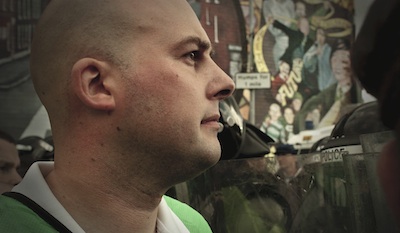
Seventeen nationalists are to sue the PSNI police and Crown prosecutors after a judge dismissed allegations that they staged an unlawful protest during a sectarian parade in north Belfast.
A judge on Tuesday threw out the case after being told the Ardoyne men had simply been watching the parade pass through the republican area.
It was alleged that their presence during an Apprentice Boys parade was an unnotified protest and as such, amounted to a breach of public processions legislation.
Even though no placards or signs were on display, a prosecution lawyer contended that by facing the road (to view the parade) they were staging a form of demonstration.
It was also claimed some of them were recognised as having previously taken part in actions by a local residents group, the Greater Ardoyne Residents Collective (GARC).
Video footage of the incident played in court showed the men simply standing on a footpath to observe the parade. Prosecutors admitted their behaviour was silent and peaceful.
Defendants clapped as they were acquitted, before turning their attention to possible civil action on the basis that their basic right to assemble had been infringed.
Mr Fennell, a spokesman for GARC, said: “There was absolutely no evidence of any protest. This was a political show trial because of our perceived beliefs.”
He said people from Ardoyne and Rasharkin had been subjected to sectarian parades and were entitled to observe the Apprentice Boys march for any breaches of Parades Commissions determinations.
Mr Fennell also pledged: “As a result of this each of the defendants is going to be taking a civil case against the PSNI and PPS. This trial was an attempt to impinge on our human right to assembly in our area.”
A lawyer for some of the defendants later confirmed their plans to sue.
Darragh Makin of KRW Law said: “This is an example of very wide legislation being used by the police and the prosecution in an in appropriate and arbitrary way.
“We will now be taking civil actions against the relevant authorities for violating our clients’ human rights.”
![[Irish Republican News]](https://republican-news.org/graphics/title_gifs/rn.gif)
![[Irish Republican News]](https://republican-news.org/graphics/title_gifs/harp.gif)

